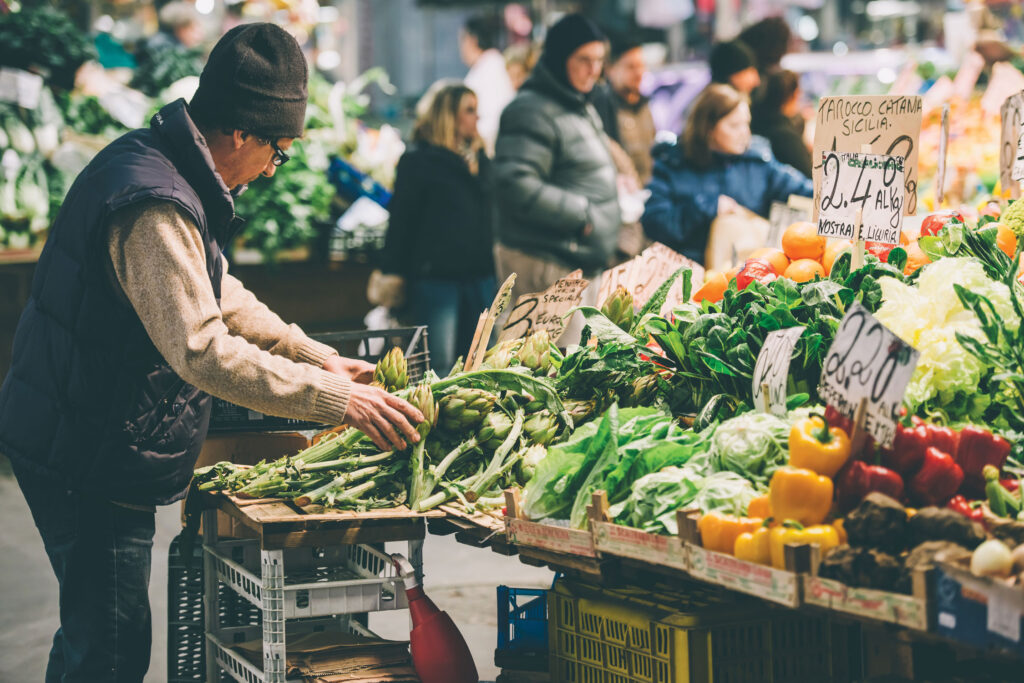Advertisement
A Week’s Celebration of Organic
Get your groove going between September 8 and 16

“The future’s so bright, I gotta wear shades.” Timbuk3 could have been talking about the organic movement in Canada when the group sang these words in their 1986 musical hit.
It’s evident in everything from the increasing presence of organics in grocery stores and the latest research reports to the excitement surrounding the ninth annual Organic Week, a national celebration of foods, farming, and products across Canada.
From September 8 to 16, people from coast to coast are invited to participate in what has become a success story for Canadian agriculture that supports a healthy environment, sustainability, and human health.
Ask Tia Loftsgard, executive director of the Canada Organic Trade Association (COTA), and she can tell you the organic industry is “growing like crazy.” Whereas the conventional agricultural sector sees growth of 4 percent annually, organic is the fastest growing agricultural sector at 15 percent.
And we’re ahead of the game from a production point of view, weighing in at 2.2 percent nationally, compared to 1 percent worldwide, she said in a recent interview.
Advertisement
A booming industry
These stats come from a long-awaited update on our national organic scene, The Canadian Organic Market Trends and Opportunities 2017, just released by COTA, an association representing our organic sector and whose mission it is to promote and protect the growth of the organic trade to benefit the environment, farms, the public, and the economy.
Canada is the fifth largest organic market in the world with an estimated sales value of $5.4 billion, with over 5,000 certified organic operations nationwide and annual growth of 8.7 percent since 2012.
Fresh fruits and vegetables remain a dominant organic choice, but baby food has been the fastest growing category segment over the last five years and now equates to more than 60 percent of the baby food market within mainstream retailers.
“There’s substantial research about the effects of exposure to pesticides in children under three,” Loftsgard said in response to the popularity of this choice.
Advertisement
Impacts on health
Some of this evidence was in a 2016 European Parliament Research Service report on the impact of organic food on human health. “Epidemiological studies,” it noted, “point to the negative effects of certain insecticides on children’s cognitive development at current levels of exposure. Such risks can be minimized with organic food, especially during pregnancy and in infancy.”
Other report highlights included the fact that organic milk has higher omega-3 fatty acids compared to conventional products, as well as that antibiotic use in conventional animal production is a key cause of antibiotic resistance. So the switch to organic methods, in which antibiotic use is restricted, could mitigate this risk and have “potentially considerable benefits for public health.”
Advertisement
A friendly future
It’s a message the millennials have picked up on, according to Loftsgard at COTA, and backed by their latest report findings. Those aged 18 to 24 are driving organic growth. Why? They’re reading labels. They don’t necessarily trust claims. They’re educating themselves and trying to improve their food quality. For others, it’s an ethical issue of animal welfare.
“This is a second-generation consumer group [after their parents]. They’ve never known a world without recycling. They were born with environmentalism in their genes,” she said.
The result is one you have may have seen first-hand—organic sections creeping into or expanding at your local grocer. Five to 10 years from now, Loftsgard says that up to 50 percent organic content in grocery stores wouldn’t be unreachable, based on current trends.
Clearly, there’s no better time to celebrate than this month, with Organic Week. Last year, people participated in a host of events from pickling workshops to organic food and drink tastings. If you’re looking to participate, check out ideas at organicweek.ca.
Organic Week online— get involved
During September, consumers can enter to win organic prizes by participating in Organic Week’s two consumer contests. Contest details are available at organicweek.ca.
Choose Canada Organic Recipe Contest
Contest open September 8 to 16
Cook it, snap it, share it! The next time you’re making a meal, choose certified Canada Organic ingredients! Cook and share a video or photo of your organic recipe on Instagram, Twitter, Facebook, or Pinterest with the hashtag #ChooseCanadaOrganic to enter.
Organic IQ Quiz
Contest open during September 2018
How well do you know organic? Take the online quiz to find out and be entered into a draw for a chance to win.
Consumers can also join organic conversation during the Twitter chat #OrganicChat taking place on September 11, 2018 at 2 pm ET, hosted by @OrganicWeek.
Organic beyond foods
Who knew buying products of organic cotton could make such a significant difference in protecting global health?
The Organic Cotton Initiative did, that’s who. It’s a joint project between the Global Organic Textile Standard and the Soil Association, the latter being the UK’s largely organic certifying body.
Benefits of organic cotton
- Organic cotton mattresses, clothing, baby supplies, and personal care products are pivotal for several key reasons, starting with the fact that organic cotton production supports international farmers’ rights, as they aren’t obligated to use genetically modified cotton seed.
- Cotton grown organically reduces pesticide use, protecting the environment and the families of farmers and beyond. Otherwise, cotton can be a crop with high pesticide consumption.
- Organic cotton farmers also grow more diversity of crops, promoting food security and a diversity of income sources.
- Healthier soils further reduce water usage and promote resilience during droughts.
- Less pesticides and nitrogen-based additives mean that organic cotton produces fewer greenhouse gas emissions, becoming a “sink” to remove CO2 from the atmosphere.
Other organic fibres with similar benefits
Combined with cotton, this category represents a $116.4 million industry in Canada and a 2.45 percent share of domestic market sales, according to the Canada Organic Trade Association’s recent report. Some of the other organic fibres available include
- wool
- hemp
- flax (linen)
Other nongrocery items worthy of note
- Your pet’s organic meals equate to $10.3 million in sales annually in Canada.
- Organic flower statistics aren’t wilting at $5 million in sales.
Overall, the organic nonfood sector, including textiles, body care, and pet food, is valued at $311 million.
On the go for organic
With the industry on a rising wave, you won’t have to look too far to find organics in
- natural and health food stores
- grocery markets
- cafés and restaurants
- farmers’ markets
- local farms
- community delivery programs supporting local farmers
Back to organic school
Organic foods—how they’re made, produced, shipped, and sold—meet strict national standards in Canada. Products that have been “certified organic” adhere to the Canadian Organic Standards, first launched in 2009.
These products, including imported products, go through certification by third-party bodies either here or in their country of origin through equivalency arrangements and can use the Canada Organic logo if 95 percent or more of their ingredients meet organic requirements.
What organic doesn’t have
- GMOs; irradiated ingredients
- persistent pesticide use
- synthetic fertilizers
- routine use of drugs, antibiotics, or synthetic hormones in livestock
- sewage sludge
- irradiation
- artificial food colours, flavours, sweeteners, preservatives, or processing ingredients
What organic does have
- promotes and protects biodiversity
- nurtures the soil through earth-friendly measures such as using compost and crop rotation over pervasive pesticide use.
—Source: Canadian Organic Growers (cog.ca)





